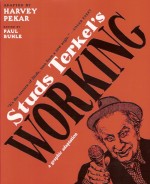
By Harvey Pekar & various, edited by Paul Buhle (The New Press)
ISBN: 978-1-59558-321-5
Further pushing the boundaries and stoking the social conscience of American comics, the truly unique Harvey Pekar, with a coterie of his best artistic collaborators, has adapted a landmark book by an immense talent and irreplaceable social commentator.
Louis Terkel was born in New York on May 16th 1912, son of a Jewish tailor. When he was eight the family (father Samuel, mother Anna and older brothers Ben and Meyer) moved to Chicago where the family ran a rooming house. The later writer “Studs” cited this crossroads of society as the root of his interest in and understanding of broad humanity.
He studied law, married, and worked at many professions including hotel concierge, actor, and even writer; working with the Depression-era Works Progress Administration’s Federal Writers Project before finding a true home in broadcast radio: everything from soap opera, voiceovers, news and sports announcing, disc-jockeying, advertising and scripting.
In 1952, he turned his semi-improvisational, picaresque television-drama Studs’ Place into a five-days-a-week, hour-long radio chat show entitled The Studs Terkel Program, where he interviewed the Great and the Good and every shade of person in-between for 45 unbroken years. In 1956 he published his first book Giants of Jazz, and followed it with many other volumes of non-fiction, all exploring the historical role of the common man, and exploring the social condition and context of the nation. He was awarded the Pulitzer Prize for Non-Fiction in 1985 for The Good War: An Oral History of World War Two. Studs died on Halloween, 2008, due to complications from a fall.
He was probably America’s greatest proponent of Oral History; the lives of ordinary people in their own words, compiled to form a human-scaled understanding of the past and present seemed so much more open and honest than great events starring great men, written down by great story-tellers.
In 1974 he released the epic Working: People Talk About What They Do All Day and How They Feel About What They Do (ISBN: 0-39447-884-5) to such critical acclaim that it was adapted as a Broadway show in 1978 and a PBS TV show in 1982. And now that other champion of the “Ordinary Joe” Pekar, in conjunction with acclaimed social historian and academic Paul Buhle, has produced this magical tome that graphically expands on this seminal work, and will undoubtedly whet readers’ appetites for the rest of the book – and perhaps a few more serious tomes. It’s certainly what our industry and art-form – too long considered frivolous, juvenile and crassly commercial – could do with…
Thanks to the startlingly varied artistic approaches and skills of fellow adaptors Pablo G. Callejo’s, Gary Dumm, Danny Fingeroth, Peter Gullerud, Bob Hall, Ryan Inzana, Sabrina Jones, Peter Kuper, Terry LaBan, Dylan A.T. Miner, Pat Moriarity, Emily Nemens, Joan Reilly, Sharon Rudahl, Nick Thorkelson, Anne Timmons and Lance Tooks what could have been a worthy but dull illustration of sparkling interviews with a broad spectrum of ordinary Americans becomes in fact a sparkling visual extravaganza that perfectly marries the text to the icon-ized hopes, joys, regrets and passions of the interviewees.
Sub-divided into the categories Working the Land, Pecking Order, Footwork, In the Spotlight, Behind a Desk, Appearance, Cleaning Up, Second Chance and Looking After Each Other (From Cradle to Grave) the 28 individual stories here range from the tragic indifference of The Hooker, the passion of the Union Organizer and the frustration of the migrant Farm Worker to the simple joy and fulfillment of the Mail Carrier and the Baby Nurse with each tale more moving than the last.
The New Press is a not-for-profit alternative to Corporate publishers, established in 1990 and dedicated to innovation in publishing and the promotion of creative works of educational, cultural and community value. They’re not in it for the money and you can find out more about them at www.thenewpress.com.
Then you can buy this magnificent piece of narrative art and give them the wherewithal to do something else that’s great to read and a benefit to our art form.
© 2006 Harvey Pekar & Paul Buhle. All Rights Reserved
